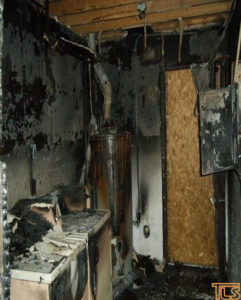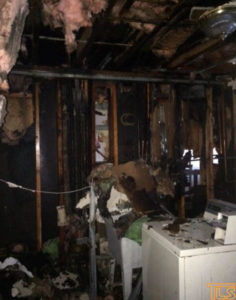 In light of the nature of recent fire calls, the Lakewood Board of Fire Commissioners in conjunction with Fire Chief Mike D’Elia Jr., Fire Prevention Coordinator Jacob Woolf, and the members of the Lakewood Fire Department, offer the following information to prevent fires in Boiler/Furnace Rooms.
In light of the nature of recent fire calls, the Lakewood Board of Fire Commissioners in conjunction with Fire Chief Mike D’Elia Jr., Fire Prevention Coordinator Jacob Woolf, and the members of the Lakewood Fire Department, offer the following information to prevent fires in Boiler/Furnace Rooms.
Many homeowners (and renters) are utilizing the boiler/furnace room and/or the laundry room as a storage room. As the photos below indicate, this practice can result in tragic consequences.
The boiler/furnace room should NOT double as a storage room!
Over the years, homes and apartments, accumulate a great deal of items – clothing, boxes of files, paper supplies, holiday decorations, half-empty paint cans, solvents, cleaning supplies, etc. Having the items available is great, but many fail to take the proper precautions when storing these items.
A leading mistake is using the boiler or furnace room as a storage area for these combustible materials. Many homeowners succumb to temptation and build shelves for storage in these rooms or just stack items next to the appliances. The Lakewood Fire Department has responded to fires caused by flammable and combustible materials stored too close to boilers, furnaces, water heaters and other mechanical equipment. The outcome of these fires ranges from minor damage costing several thousands of dollars to complete destruction of the entire home.
The boiler/furnace room should NOT be considered an all-purpose storage area!
Boilers, furnaces, water heaters and dryers, etc. all require proper air circulation to prevent incomplete fuel combustion and production of carbon monoxide. In fact, boiler, furnace and laundry rooms are designed with excess space to allow for the proper airflow and ventilation needed, or at least they should be. Therefore, keep these rooms clean and clear of all unnecessary items.
 Another risk for boiler and furnace rooms or rooms that generate more than their share of heat, is spontaneous combustion of material. This occurs when combustible material in contact with air generates enough heat to ignite. This can happen when items such as clothing, other items or mattresses (yes, we’ve seen this too) are stacked next to the appliances. Even without any items physically touching any appliances the overcrowding of an already relatively small size room creates a fire hazard. The boiler/furnace room should be clean and clear of all unnecessary items!
Another risk for boiler and furnace rooms or rooms that generate more than their share of heat, is spontaneous combustion of material. This occurs when combustible material in contact with air generates enough heat to ignite. This can happen when items such as clothing, other items or mattresses (yes, we’ve seen this too) are stacked next to the appliances. Even without any items physically touching any appliances the overcrowding of an already relatively small size room creates a fire hazard. The boiler/furnace room should be clean and clear of all unnecessary items!
Importance of smoke detectors and carbon monoxide detectors.
Remember, that smoke detectors provide early warning of a fire, allowing extra time to escape, and as a result, substantially reducing the risk of injury and/or death in residential fire. Smoke detectors should be located outside each separate sleeping area and on every floor of one’s home including the basement. Carbon monoxide detectors should be located outside each separate sleeping area. A few minutes should be spent each and every month to test smoke and carbon monoxide detectors to ensure they are operational.


Thank you ! I’m cleaning out my boiler room now …
I am a Licence Home inspector. I am offering for a limited time a free home safety inspection. Protect your home and family now. I will walk thru your home and check your home for any safety hazards that exist. I can be reached at 7325690544 or at [email protected] Thanks
not changing the facts of the problem just please note these pictures are from a dormitory or apartment building as they are coin operated machines…
To note,
The pictures are for visual purposes. The concern remains the same regardless.
Jacob Woolf
Fire Prevention Coordinator
Does the concern remain the same if there is a hot water heater, house didn’t have gas only electric so no furnace?
It is not clear from your question whether the entire house is electric run or just the hot water heater. Regardless, in general, these appliances – dryers, hot water heaters, etc – are situated in relatively small rooms and will generate their share of heat. Even without gas, and therefor no issue of carbon monoxide, there still remains the risk of spontaneous combustion. Any unnecessary storage further confines an already small space and presents a fire hazard. Remember, these rooms are not designed for storage and that extra space is there to allow for adequate air flow and ventilation. As a general rule, keep these areas clear. Gas or electric.
Jacob Woolf
Fire Prevention Coordinator